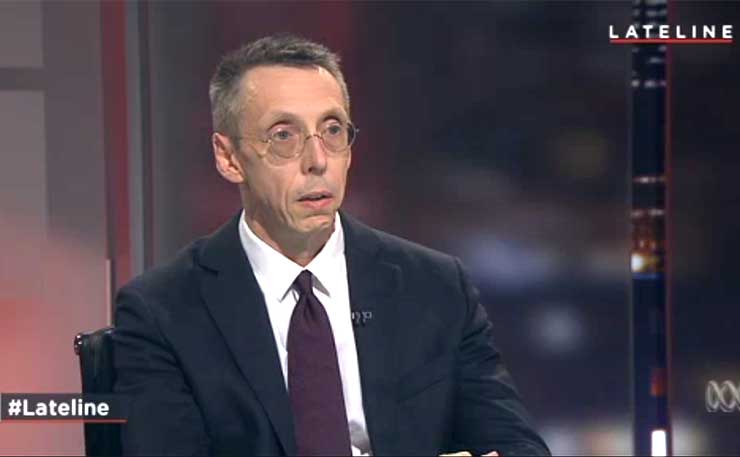Recent investigations by the Australian Federal Police into alleged breaches of government secrecy laws aimed at protecting Commonwealth government information raise serious questions about whether these laws adversely affect our criminal justice system, writes Tim Conboy, from Maurice Blackburn’s Social Justice Practice.
Confidence in the criminal justice system must rest, at least in part, on its fulfilment of our expectation that the laws it enforces will be applied consistently, irrespective of the political climate.
Yet in light of the Guardian’s revelations that the AFP launched an investigation into Dr Peter Young, who worked as a psychiatrist in immigration detention, following his criticism of the government’s policy in respect of people seeking asylum, it is hard not to question whether the Australian government’s secrecy laws pass this test.
The AFP accessed Dr Young’s telephone records after detailed medical notes in relation to Hamid Khazaei, a Manus Island asylum seeker who died in September 2014 when a cut on his leg progressed to septicaemia, were reported by the media.
The AFP has since confirmed that the Department of Immigration made a referral to it over the leak.
The Commonwealth Crimes Act makes it a criminal offence for any person employed by the government, or who assists in Commonwealth operations, to disclose information they have come across through their work.

A person’s duty to refrain from disclosing information must arise independently of the Crimes Act, but will, in many cases, readily arise as a result of public service guidelines (for public servants) or contracts of employment or engagement (for many other people caught by the law).
The end result is that most people who work for, or are engaged by, the Commonwealth government are likely to be committing an offence whenever they talk to anyone who is not legally entitled to receive it.
The Australian Border Force Act creates a similar offence, although the Act itself gives rise to the obligation to keep information secret in the context of immigration detention and the customs and border control network. Breaches of both secrecy laws carry a maximum penalty of two years’ imprisonment.
So what is the purpose of these laws and what is at stake? On one hand, there is the goal of ensuring the security of the nation and the government, and the efficiency of government action. On the other, there is the risk that the cloak of secrecy is maintained, even when government policy harms people or leads to waste.
The government secrecy laws put the AFP in an unenviable position in a highly political environment. This, in turn, tends to lead to complaints that the system selectively enforces the secrecy laws, and claims that people targeted by the AFP for investigation are targeted not by reference to the likelihood of a conviction, but on the basis of decisions that have a political flavour.
Whether warranted or not, claims of selective enforcement of government secrecy laws are arguably inevitable when the laws concerned are so broadly drafted and do not require that disclosures, in order to be criminal, cause harm to the government or the community.
The Australian Law Reform Commission (ALRC) has recommended that government secrecy laws be amended to require that any disclosure, in order to be criminal, must:
(a) damage the security, defence or international relations of the Commonwealth;
(b) prejudice the prevention, detection, investigation, prosecution or punishment of criminal offences;
(c) endanger the life or physical safety of any person; or,
(d) prejudice the protection of public safety” (or be reasonably likely to, or be intended to bring about such a result).
Other measures are also proposed that the ALRC argues will make these laws more targeted.
Whichever party wins government after the federal election on July 2, the ALRC’s recommendations in relation to both pieces of legislation should be heeded and the laws should be changed.
This is all the more pressing because, as Greg Barns of the Australian Lawyers Alliance has suggested, the moves to outsource the provision of services such as immigration detention services that have traditionally been provided by the state to private companies, provide a new dimension to the tensions caused by the government secrecy laws.
How would public confidence in the criminal justice system be affected if it were argued that government secrecy laws were used in the case of disclosures made that seemed only, or most readily, to embarrass and adversely affect a private company?

Unless changes to the laws are made, the maintenance of secrecy to undermine the rationale for the laws’ very existence will continue. For there’s no point in keeping government matters secret in the interests of efficiency, safety and security if to do so actually gives rise to policies that hurt people and waste public money.
Our politicians already seem convinced that the light of day should sometimes be shone on practices that might otherwise be secret because of the usual operation of secrecy laws. The previous federal Labor government passed the Public Interest Disclosure Act. This Act tries to immunise whistleblowers against criminal and civil sanctions for speaking out on matters of public interest, although the protection under this legislation is not automatic.
Any person wanting to rely on this protection needs to follow a stringent process in relation to how they make their disclosure and to whom, and then hope that they can successfully run a legal argument that their disclosure was in the ‘public interest’ for the purposes of the Act.
Importantly, disclosing information to the public at large may not qualify as a disclosure in the ‘public interest’. The Act, therefore, does not sufficiently counter the chilling effect that secrecy laws have on people’s willingness to come forward and call out wrongful and/or wasteful conduct in ways that actually bring about changes to bad policies.
Courageous whistleblowers know the risks they are taking when they come forward. Let’s hope they continue to speak out. But why don’t we insist on changes being made to government secrecy laws and, therefore, ask less of them when they put their necks on the line to call out wrongful conduct when they see it?
Donate To New Matilda
New Matilda is a small, independent media outlet. We survive through reader contributions, and never losing a lawsuit. If you got something from this article, giving something back helps us to continue speaking truth to power. Every little bit counts.





